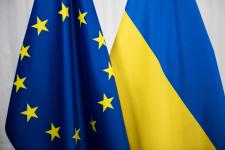
The European Commission (EC) outlined today a number of concrete actions to support the EU countries in welcoming and meeting the needs of those fleeing the war in Ukraine. The actions also draw upon the provisions of the EU action plan on integration and inclusion 2021-2027.
With some 3.5 million people arriving in the EU within just 4 weeks of the start of the war against Ukraine, the EU activated its Temporary Protection Directive for the first time in order to offer quick assistance at the border, reception and civil protection (see also the new guidelines for the directive's implementation published on 21 March 2021). Building on those initial measures, the EU is taking further steps to help EU countries ensure beneficiaries can effectively access their right to education, healthcare, accommodation and jobs, and assist their early integration.
The communications outlines the following actions:
- Offering a safe haven in the EU
The EC notes that while support for those fleeing the war must be immediate, the EU also has to factor in the possibility of their prolonged stay and future needs.
The EU’s response will therefore build upon the framework of the EU action plan on integration and inclusion 2021-2027. The plan provides for targeted assistance, inclusion for all, and highlights the importance of including a wide range of stakeholders, including newcomers themselves and diaspora communities.
- Special protection for children
The EC supports and funds psycho-social care and access to basic services for all children. Additional attention is given to children placed in institutions and those at risk of trafficking and abduction. The EC is also preparing dedicated standard operating procedures for the transfers of unaccompanied minors.
- Access to education
With almost half of the refugees fleeing Ukraine at school age, the EC sees their return to school as a priority, with financing ensured through the EU Cohesion Policy funds and Erasmus+. The EU will also work to identify the specific needs of children and support EU countries, and will work to support and mobilise teachers - both local and those who are themselves fleeing the war.
- Access to healthcare
Giving newcomers access to the local healthcare systems is another key action for the EC and the EU countries. The provision of psychological support and vaccinations against COVID-19, in addition, are noted as priorities. A solidarity mechanism for intra-EU medical transfers is also in the making, with 10 000 hospital beds already secured.
- Access to jobs
The EC asks the EU countries to quickly help newcomers make use of their right to work, as granted under the Temporary Protection Directive. The EC has added the Ukrainian language to the EU Skills Profile Tool for non-EU nationals to help Ukrainian job seekers and those who wish to continue their studies in the EU showcase their abilities and access support.
The EC will also start a new talent pool matching candidates with vacancies. The EU will in addition work to assist the recognition of professional qualifications obtained in Ukraine, and will also help the private sector in the hiring of persons under temporary protection.
- Access to accommodation and housing
A new 'safe homes' initiative will support Europeans who are making their homes available to those fleeing the war. The Asylum, Migration and Integration Fund (AMIF) and the Cohesion Policy funds will be mobilised to ensure initial housing solutions, while long-term accommodation would be supported through the European Regional Development Fund (ERDF). The European Social Fund (ESF), in turn, would be used to assist community-based accommodation and services, especially for the most vulnerable.
- Solidarity in action
The EC has set up a Solidarity Platform to help coordinate and support the EU countries as needed. It is meant to help organise the transfers of people to other EU countries with more reception capacity, as well as to non-EU countries such as Canada and the UK. For example, 7 EU countries and Norway have already agreed to transfer 14 500 people from Moldova.
These actions include also the private sector, with transport companies organising humanitarian trains and providing free tickets to refugees. Finally, the EU is helping the voluntary return of non-Ukrainian nationals caught up in the war to their countries of origin.
- Fast, flexible solutions to finance assistance
The EC immediately mobilised financial support for the EU countries, including through the proposal on the Cohesion Action for Refugees in Europe (CARE). The EC also will unblock access to unspent amounts under AMIF in 2014-2020.
In addition, tailor-made support via the Technical Support Instrument will help the EU countries build capacity to welcome refugees and address their integration. In addition, available funding under REACT-EU can be used in line with the objective of ensuring recovery after the pandemic.
Significant funding is also available under the agreed 2021-2027 financial framework from both Home Affairs and Cohesion Policy funds.
The full text of the communication, as well as a quick fact sheet are attached below.
We also gather regular updates on the early integration of those fleeing the war in Ukraine within the different EU countries.
Details
- Publication dates
- Source
- Posted by
